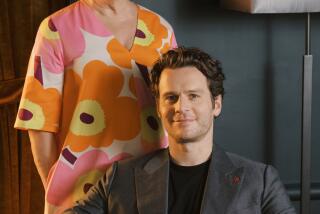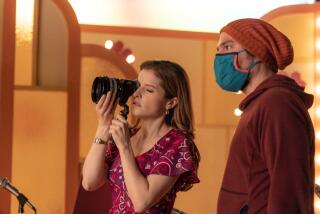MOVIE REVIEW : Cast Saves a Musty ‘Driving Miss Daisy’
- Share via
Morgan Freeman’s performances this year in “Lean on Me,” “Johnny Handsome,” and, now, “Driving Miss Daisy,” have been among the best reasons to go to the movies. (He’s also in “Glory,” the Civil War drama opening tomorrow.) Freeman has an infuriating habit of being extraordinary even in mediocre movies; his presence, alas, makes them must-sees.
“Driving Miss Daisy,” (selected theaters), directed by Bruce Beresford and adapted by Alfred Uhry from his Pulitzer Prize-winning 1987 play, isn’t mediocre. It’s musty and schematic, though, with a measured pace that’s meant to incur our respect. This is “quality” theater transferred relatively intact to the screen.
The central relationship is between Daisy Werthan (Jessica Tandy), a cranky Atlanta widow and Hoke (Freeman), the chauffeur hired by Daisy’s son Boolie (Dan Aykroyd) to keep her from plowing her brand-new ’48 Packard into the neighbor’s flower beds. The film takes us through 25 years of winsome acrimony between these two. Their mellowing relationship is meant to mirror the growth of civil rights in the South. Daisy is Jewish, and so the movie is structured as a tale of two outcasts bonded by their stubborn pride.
It is to everybody’s credit that the stubbornness never gets mushed into sentimentality, at least not overtly. Freeman and Tandy have their own performer’s pride, and that transfers to their characters. Tandy, in particular, is almost astringent in her denial of easy emotion. When something heartfelt occurs in this movie, you accept it without too much squirming. The disciplined yet intuitive way in which these actors connect is a model of ensemble performance.
One of the film’s pleasant oddities is that Hoke and Daisy seem to look younger as they grow older. Bickering brings out their human contours; it gets their spirit up. Hoke plays a canny game with Daisy; he does her bidding without lapsing into servility.
It would have been easy for Freeman to distance himself from this character by cuing us with modern attitudes. Instead, he accepts Hoke’s subservience as a characteristic of the man’s innate graciousness. Daisy is, in fact, subservient to him, but he never throws her helplessness back at her. The shadow play between Hoke and Daisy is immensely subtle, even though the film is structured as a series of mini-revelations about the nature of interracial brotherhood. The actors know those lessons don’t come easily.
The predictability of “Driving Miss Daisy” (rated PG) derives from the play’s tone of civic uplift. The tensions between Hoke and Daisy exist only to be resolved. Their 25-year communion is more than a personal triumph; it is intended as a moral triumph as well. This may be too much baggage for such a frail vehicle, and the occasional bulletins from the front--like the bombing of the local synagogue or a speech by Martin Luther King--don’t seem to be taking place in Hoke and Daisy’s shuttered universe.
Since Uhry bothered to “open up” the play, he should have opened up the cast of characters a bit more, too. The sequences in which Hoke talks with his friends, or with Daisy’s maid, Idella (Esther Rolle), are revelatory. We can see how he drops his guard with them, how he moves freer, talks more animatedly. There’s more of an edge to his sequences with Idella, in fact, than with Daisy, and that’s largely because in those moments Uhry isn’t pushing his customary principled restraint.
Rolle’s role is small, but it’s a major performance. The same indignities that Hoke has braced himself against all his life have all but destroyed her. But Idella isn’t anybody’s mammy, and her sass gives the movie a much-needed jolt of rage.
It’s the sort of rage that would be out of place in Hoke’s life, or in Freeman’s performance. I hope nobody chooses to jump on Freeman’s work here as a species of Uncle Tom-ism. By staying within the modest restraints of the role, Freeman does justice to Hoke’s circumstances. The performance is not an apologia, it’s a tribute. Freeman recognizes the heroism of a man who creates a life for himself based on kindness in an unkind world.
‘DRIVING MISS DAISY’
A Warner Brothers release. Executive producer David Brown. Producer Richard D. Zanuck and Lili Fini Zanuck. Director Bruce Beresford. Screenplay Alfred Uhry, based on his play, “Driving Miss Daisy.” Music Hans Zimmer. Production design Bruno Rubeo. Costumes Elizabeth McBride. Film editor Mark Warner. With Morgan Freeman, Jessica Tandy, Dan Aykroyd, Esther Rolle.
Running time: 99 minutes.
More to Read
Only good movies
Get the Indie Focus newsletter, Mark Olsen's weekly guide to the world of cinema.
You may occasionally receive promotional content from the Los Angeles Times.










